The $2 Trillion Founder Playbook: The Untold Story of How Larry Page Reclaimed Google
how Larry Page quietly reclaimed control of Google - a masterclass in patience, power, and strategic leadership every founder should know.
In 2001, Larry Page was fired from his own company. The company he helped create. But he wasn’t fired officially.
There was no scandal, no dramatic boardroom blow-up. Just a growing sense among investors, advisors, and even some early employees that Page was too young, too technical, too idealistic to lead a fast-scaling organization…
Brought to you by Attio - The CRM used by both startups and VCs (including me)
I use Attio to manage deal flow, track founder conversations, and sync everything across my team — no clunky setup required.
Startups use it as a sales CRM from day one
VCs use it for deal tracking, LPs, and intros
Fully customizable and updates automatically
It’s fast, flexible, and built for how we actually work.
…the final straw that broke the proverbial donkey’s back was a move from Page to eliminate all project managers overnight. The decision has triggered confusion, backlash, and ultimately led to a reshuffling of power within the tech giant.
The board decided to appoint Eric Schmidt as the new Google CEO. Page was sidelined, still co-founder, still influential, but no longer in control.
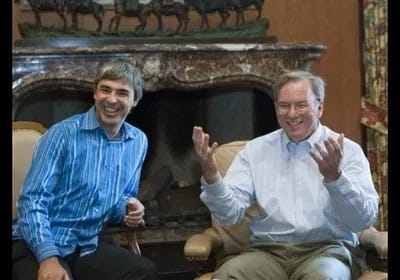
This wasn’t just a leadership transition. It was a moment of existential whiplash. One of the most brilliant startup minds of his generation had built a rocket ship and been told he couldn’t fly it.
Most people know Google’s history as a success story. Few realize it’s also a founder’s cautionary tale, and, eventually, a masterclass in reclaiming control.
What followed over the next decade wasn’t loud or obvious. Page didn’t rant, resist, or exit.
He chose to play the long game. To observe, to learn to wait. And when the time was right, he returned, not just to lead again, but to redesign the company’s structure, cement his authority, and future-proof the vision that started it all.
This is not a company profile. This is the untold Larry Page story, and the startup founder lessons hidden inside it. You’re about to read a playbook on power, patience, and strategic resurrection.
Table of Contents
1. From Dorm Room Algorithm to Silicon Valley Rocket Ship
2. Playing the Long Game: Power Without the Title
3. When Principle Clashes With Power: The China Breakpoint
4. The Quiet Coup: Larry Page Reclaims the Throne
5. Alphabet: The Genius Restructure That Cemented Control
6. The Founder’s True Role: Build the Future, Not the Org Chart
7. The Narrative War: Why Quiet Founders Must Build in Public
8. Founders: Here’s What You Should Take Away
1. From Dorm Room Algorithm to Silicon Valley Rocket Ship
The Curiosity That Started It All
Before he became the quiet architect of a $2 trillion empire, Larry Page was a Stanford grad student obsessed with a simple idea: what if the links between web pages could reveal something deeper about information itself?
That question gave birth to PageRank, an algorithm that treated hyperlinks like academic citations. Instead of counting keywords, it mapped the web’s credibility.
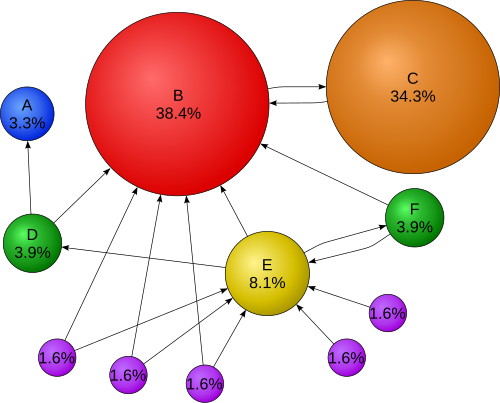
This wasn’t a fluke of luck or timing. It was a product of Page’s intellectual DNA: the son of a computer science pioneer, shaped by Montessori education and a childhood surrounded by machines and magazines about tech revolutions. He wasn’t even trying to build a company. He was trying to answer a question.
And then, Sergey Brin came along. A fellow Stanford PhD student equally curious, slightly skeptical, and eventually all-in.
What’s interesting is that the two didn’t get along at first, but their shared love of solving impossible problems turned into one of the most productive intellectual collisions in tech history.
From Research Project to Real Company
Their early prototype was called “BackRub”. It was raw but effective. By 1998, they rebranded it as Google, a nod to “googol,” the number 1 followed by 100 zeros.
The pair worked out Susan Wojcicki’s garage in Menlo Park. Yes, that’s Susan Wojcicki, who later became CEO of YouTube.
They duct-taped servers together, built cases out of LEGO, and raised their first funding from Andy Bechtolsheim, who wrote a $100,000 check before they even had a company bank account.
Within two years, Google was processing over 100 million searches a day. Users loved it. VCs rushed in. And the engineering team, handpicked by Page and Brin, was shipping fast and dreaming big.
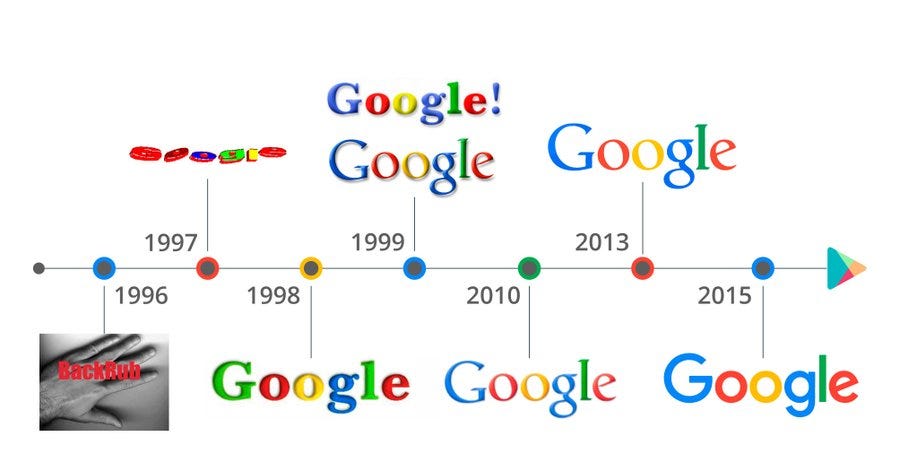
The Growing Paradox
By 2001, Google’s exponential growth had outpaced its structure. What began as an elegant algorithm was now a sprawling organization, and its original architect was beginning to clash with the systems being built around him. Page was still the visionary. But the very success he created was now the reason investors questioned whether he could scale it.
A company born from intellectual purity, speed, and engineering precision was about to do something no founder ever forgets: ask its own creator to step aside.
The Day Larry Page Was Silently Fired
In the summer of 2001, Larry Page made a decision that rattled Google’s young but fast-growing team: he attempted to eliminate all of the company’s project managers in one sweep.
To Page, this wasn’t recklessness. It was principle. He believed middle managers slowed down innovation. If engineers were trusted, focused, and left alone, they would build better products faster. He’d seen this work in small teams. He assumed it would scale.
But it didn’t.
The move triggered immediate confusion. Engineers suddenly had no one to coordinate across teams. Product timelines unravelled. Morale wavered. For a company already operating at breakneck speed, the chaos exposed something painful. It exposed Page’s instincts as a founder hadn’t yet evolved into the judgment of a CEO.
Enter “Adult Supervision”
The board had been worried for months. Google’s growth was undeniable, but its leadership lacked experience. Investors feared the company’s potential would be squandered by immaturity at the top. Page’s managerial purge became the tipping point. So they made the to bring in someone older, someone safer.
They called it a triumvirate, a shared leadership model. But the power dynamic was clear. Eric Schmidt was appointed Google CEO, and Page was quietly moved aside. And this wasn’t an ordinary replacement. The news didn’t make headlines. There was no public humiliation. But inside the company, everyone knew what had happened.
Larry Page had been demoted, not on paper, but in every way that mattered.
The Personal Cost
This wasn’t a hostile takeover. It was a soft correction. But for Page, it cut deep. He was the one that gave birth to Google. He shaped its product, recruited its earliest team, and carried the vision that brought it to life. And now, he was being asked to watch it grow up without him.
For any founder, there is no clean way to separate identity from invention. The moment the company no longer needs you to lead is the moment your creation starts to forget your hands were on its bones.
Page didn’t fight it. He stayed. But everything changed.
And in that silence, a new story began.
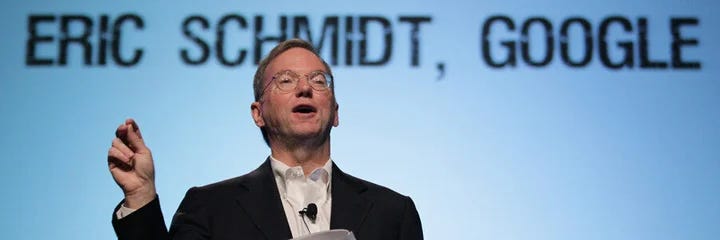
ps: I’m sharing a FREE AI Fundraising Kit — includes an AI agent, 10k investors, 50 decks & Notion, Framer, Supabase, v0 credits
2. Playing the Long Game: Power Without the Title
On paper, Google was now a three-headed operation. Eric Schmidt handled the day-to-day as CEO. Larry Page and Sergey Brin kept their co-founder titles and were supposedly focused on “products and technology.” In theory, it sounded collaborative. Stable. Grown-up.
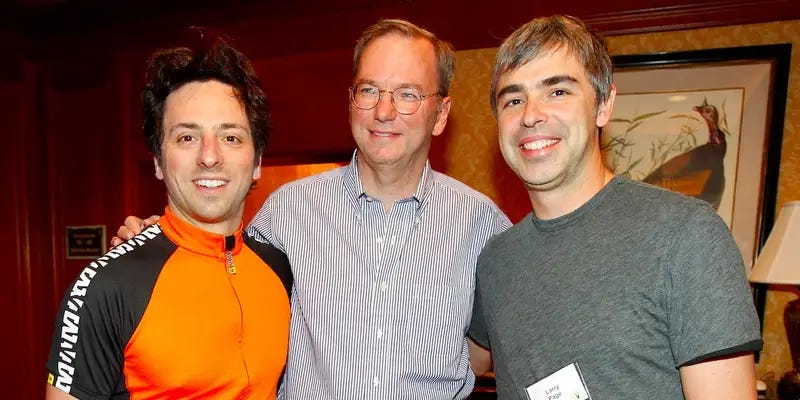
In practice however, it was more layered than that.
Page didn’t disappear into the background. He just stopped asking for permission.
While Schmidt ran operations, Page and Brin continued shaping the future. The company’s most transformative product bets in the 2000s weren’t executive mandates, but founder-driven decisions.
Gmail was launched as a skunkworks project. It was born from the founders’ belief that communication tools were too slow and too small.
Google Maps grew out of Page’s obsession with modeling the physical world in software.
Chrome started because Page was frustrated by the limits of Internet Explorer. Even the landmark acquisitions, such as YouTube in 2006 and Android in 2005, were bets Page personally championed. These weren’t flukes. They were calculated, founder-backed moves.
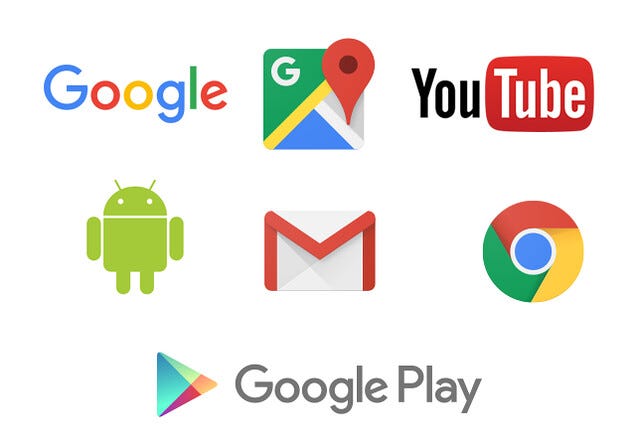
The Quiet Architect
Page didn’t need the title of Google CEO to direct the company’s trajectory. His influence operated differently: through infrastructure, through technical clarity, through the ability to spot what others missed and greenlight what others hesitated on.
Internally, teams knew who the real north star was. While Schmidt gave structure, it was Page who pointed the way forward. He picked the hard problems worth solving. He supported the engineers pushing boundaries. He seeded the experiments that became billion-user platforms.
And he did all of it without public fanfare, without press soundbites, and without ever chasing the limelight.
Influence > Ego
This chapter of the Larry Page story is one most founders miss: how to retain power without chasing visibility.
Page didn’t sulk, didn’t exit, and didn’t try to claw back his role. He chose to redefine it instead. He traded authority for leverage. Titles for outcomes. While the world thought Schmidt was running Google, Page was busy designing its next decade.
Sometimes, the most strategic move a founder can make is to step back just far enough to build something even bigger from the side.
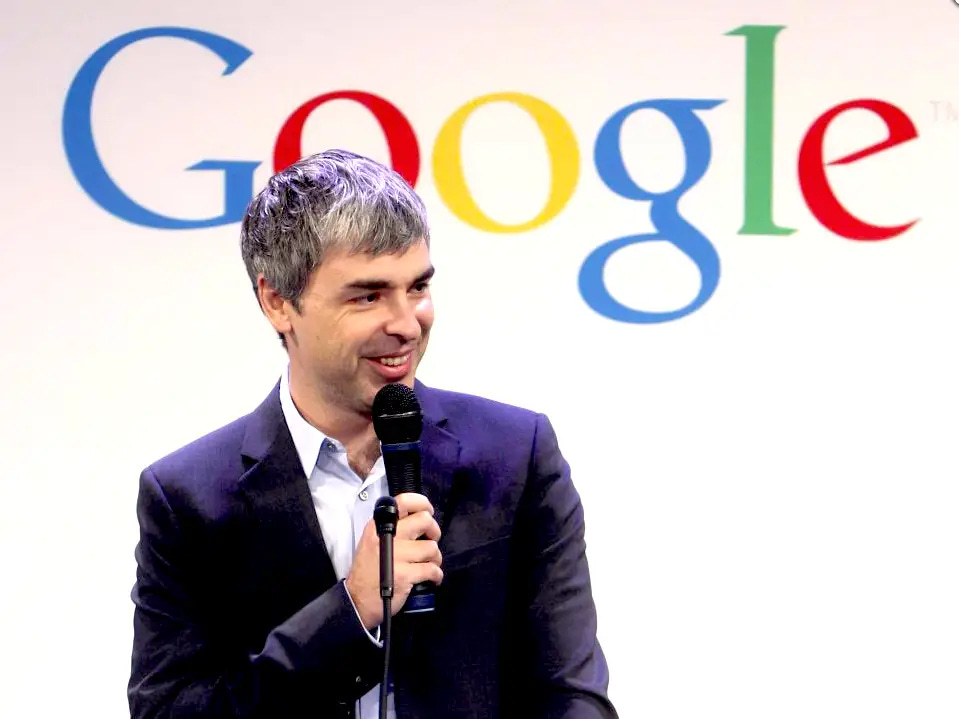
3. When Principle Clashes With Power: The China Breakpoint
In early 2010, a decision was taken that took everybody off-guard. Google would stop censoring results on its Chinese search engine, even if it meant losing access to the world’s fastest-growing internet market.
The trigger wasn’t just censorship. It was a series of sophisticated, state-backed cyberattacks, dubbed “Operation Aurora”, targeting Google’s infrastructure and the Gmail accounts of Chinese human rights activists. Internally, it sparked a debate that exposed the company’s deeper tensions.
Eric Schmidt wanted to play it safe. China was a long-term strategic market. Backing out could damage both business and diplomacy. But Larry Page and Sergey Brin saw the issue differently. Brin is a Russian-born son of dissidents, so the parallels to authoritarian repression were personal. Page was on the same page. The attacks weren’t just security breaches, they were threats to their own values.
Despite not holding the CEO title, it was the Google founders who tipped the scales.
The company announced it would stop censoring results. If China shut down access as a result, so be it. And that’s exactly what happened.
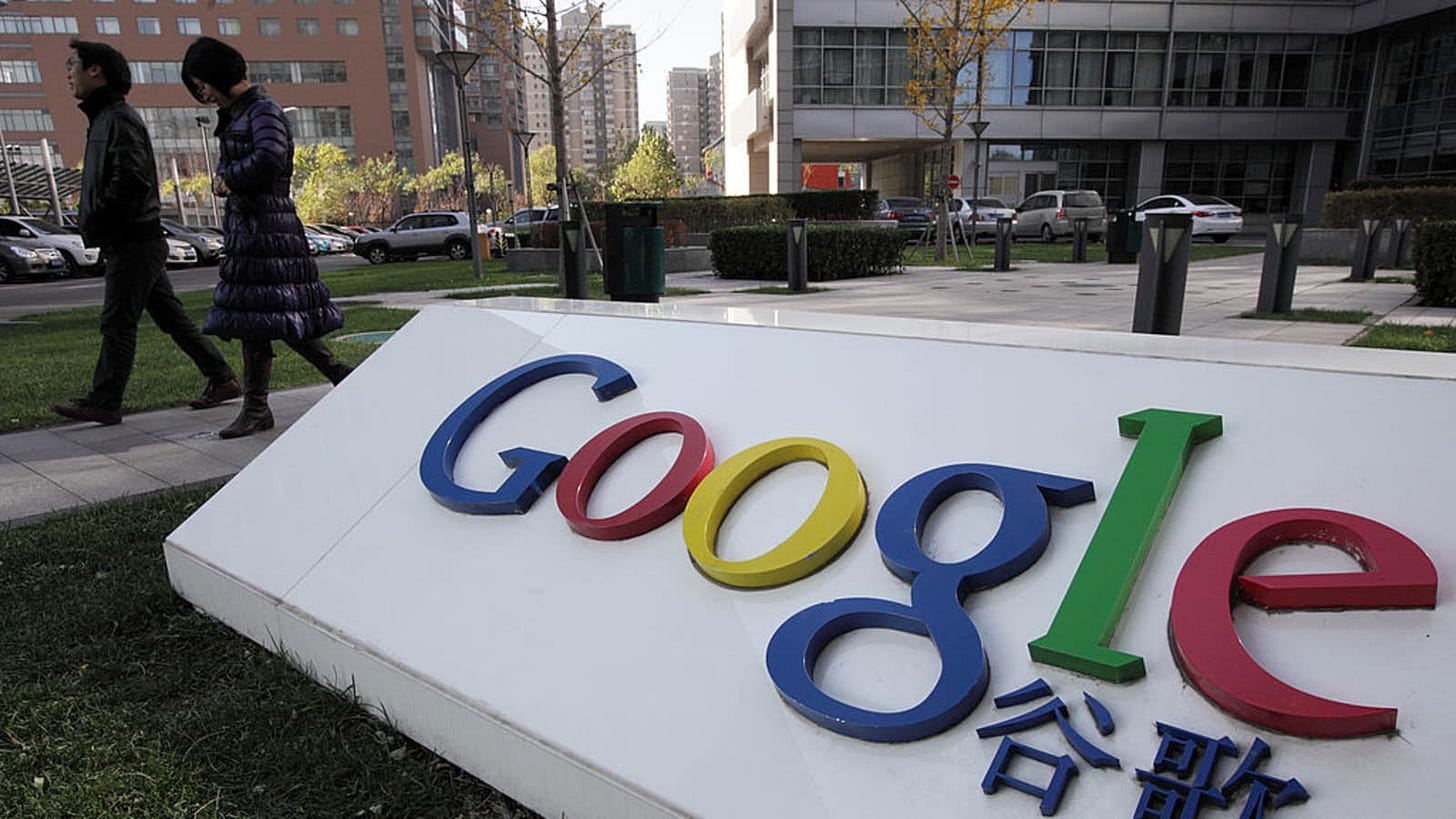
The Real Signal
On the surface, the situation looked like a corporate risk. But beneath it was something bigger. A glimpse of who really held the cards.
Even after nearly a decade away from formal control, Page and Brin’s voices still held weight in the room. When principle clashed with profit, their compass set the direction. This wasn’t about revenue anymore. It was about identity.
And for founders watching from afar, the message was clear: titles may change, but influence lives in what a company stands for.
4. The Quiet Coup: Larry Page Reclaims the Throne
On April 4, 2011, Larry Page reclaimed his throne at Google as CEO.
The tech press called it a surprise. But inside Google, people were wondering what took so long.
Page had never truly left. He’d spent the better part of a decade architecting Google’s most transformative products, backing billion-user bets, and proving, again and again, that his instincts were sharper than most playbooks.
He had grown, too. Observing Eric Schmidt’s tenure had taught him how to scale leadership without compromising vision. He knew now how to delegate, how to communicate with a bigger org, how to build teams that could move fast without falling apart.
No board meeting was necessary. Page had built his case over a decade. Schmidt’s own parting words, delivered in a now-iconic tweet, captured the moment with sharp brevity: “Day-to-day adult supervision no longer needed.”
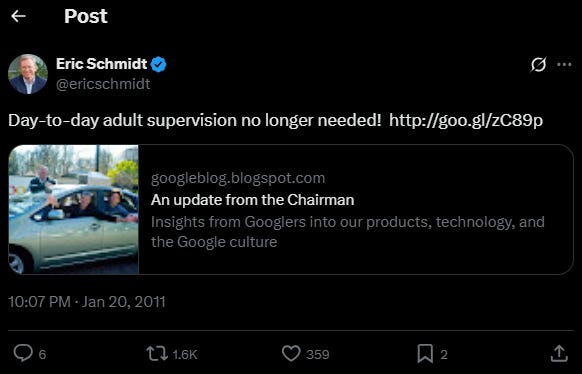
The Return That Was Never Loud
There was no stage. No manifesto. No fiery reclaiming of authority. Just a clean handover, and a founder stepping back into his role, not out of nostalgia, but because he had become the most qualified person to lead again.
This wasn’t a comeback. It was the conclusion of a decade-long power reclamation, not through politics or posturing, but through outcomes.
For founders, the lesson cuts deep. The best way to reclaim control isn't making a scene. It's building a case no one can ignore.
And when it works, it doesn’t just restore your title. It restores the architecture of your original vision.
5. Alphabet: The Genius Restructure That Cemented Control
In August 2015, Larry Page made a move that stunned the tech world, again. He announced that Google was becoming a subsidiary.
Not the parent company. Not the crown jewel. Just one unit in a larger holding structure called Alphabet Inc.
To outsiders, it looked like a rebrand or an org chart shuffle. But Page had just pulled off something brilliant. He figured out how to resolve the biggest dilemma any founder faces: how to scale a company without being pushed out by it.
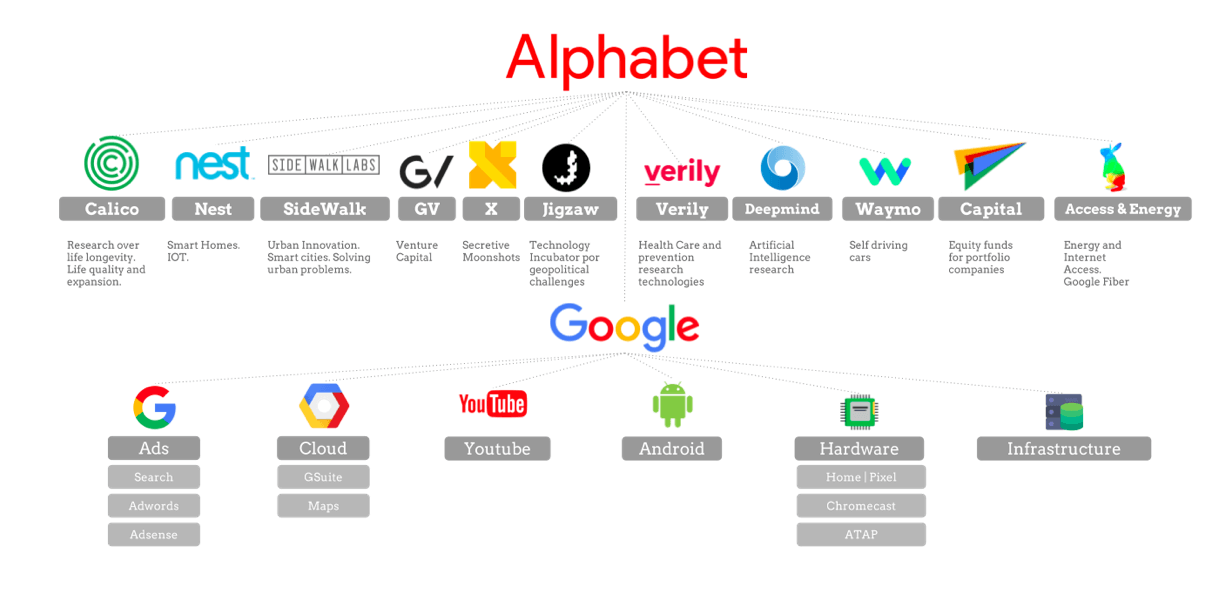
Redesigning for Founders, Not Operators
Here’s what changed: every major Google business, including Search, Ads, YouTube, Android, Maps, was carved out into its own subsidiary, with its own CEO, reporting to Google. And Google itself became just one sibling company under Alphabet, alongside other bets like Waymo, Calico, and DeepMind.
And sitting above them all, in full control of capital allocation, strategic priorities, and moonshot vision was Larry Page, now CEO of Alphabet, and Sergey Brin as President.
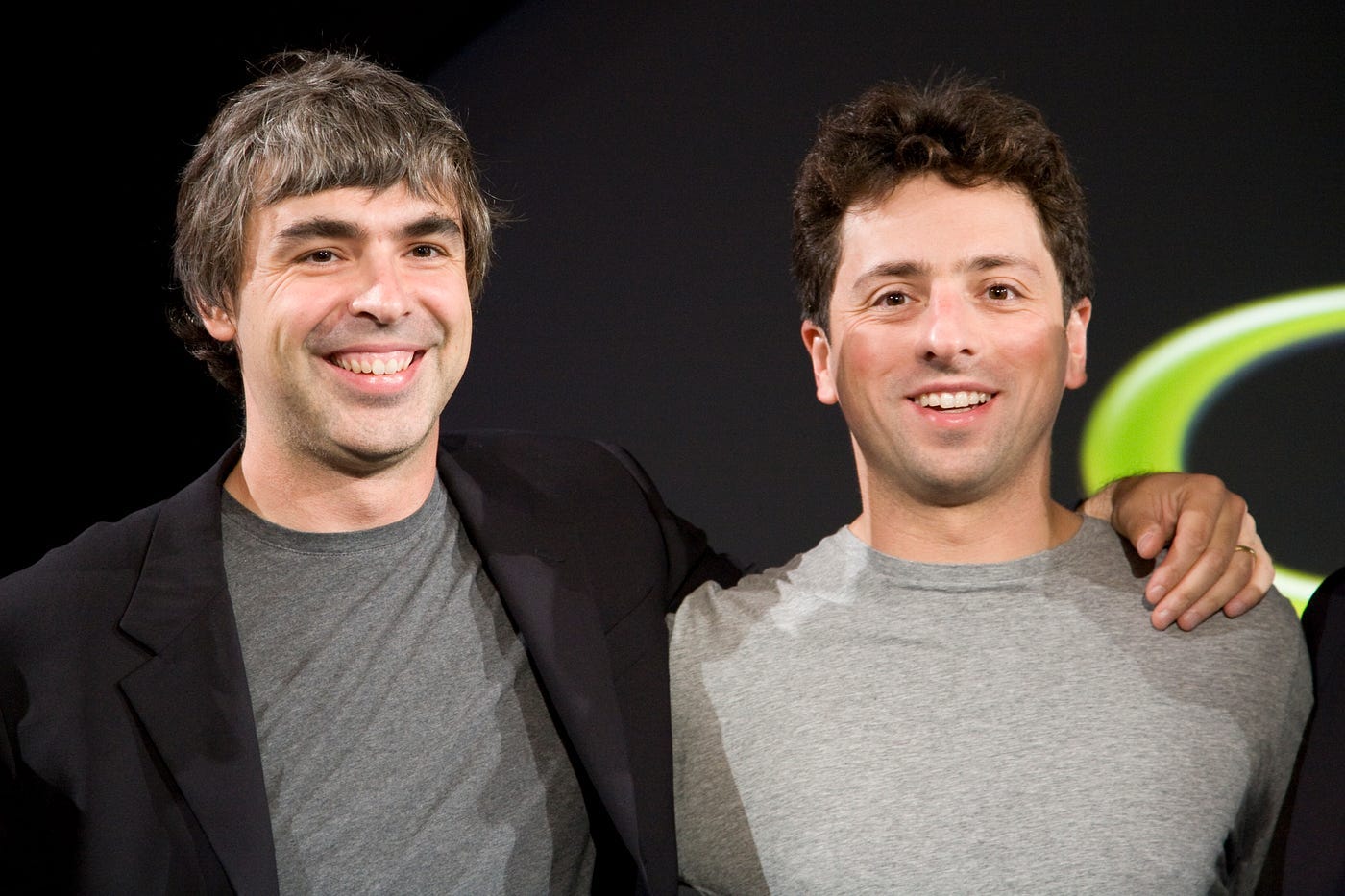
This wasn’t a demotion. It was elevation. Page had essentially made himself the architect of the empire, while freeing his lieutenants to run the operations.
He no longer had to choose between scale and creativity. He got both by design.
Power, Rewired
Alphabet was more than a corporate restructure. It was a safeguard. A system that allowed Page and Brin to retain philosophical and financial control, while insulating themselves from the entropy of day-to-day execution.
For investors, it was innovation. For operators, it was clarity. For the founders, it was liberation.
Alphabet wasn’t about structure. It was about permanence.
6. The Founder’s True Role: Build the Future, Not the Org Chart
After the Alphabet restructure, Larry Page did something most founders would hesitate to do. He disappeared, intentionally.
He wasn’t retiring. He wasn’t checking out. He was stepping into something quieter, but no less ambitious: the role of technologist, investor, long-horizon builder.
While others fought for stage time and shareholder quotes, Page redirected his energy to the kinds of problems that don’t fit into quarterly decks. Longevity, mobility, artificial intelligence, decarbonization. Not lightweight side projects. Those were his real life’s work.
Projects of a Different Time Horizon
At Calico, he backed research into radically extending human life. At KittyHawk and Opener, he pushed for breakthroughs in electric vertical takeoff aircraft, what most people still call flying cars.
Google’s self-driving car division, Waymo, spun out from his early obsession with autonomous mobility. And DeepMind, acquired under his watch, has become one of the world’s leading AI labs.
None of these moves were about prestige. They were about purity, about returning to the original reason Page built anything in the first place: to solve impossible problems with elegant technology.
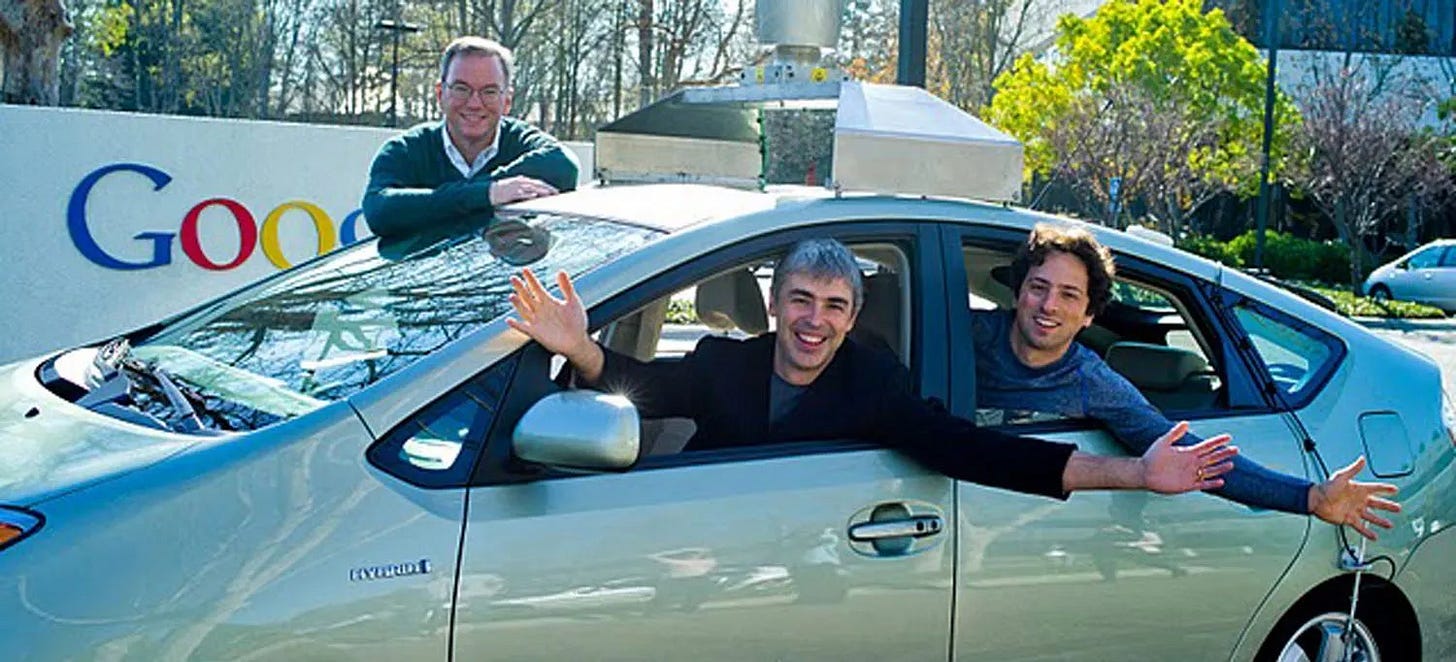
Designing Yourself Out of the Org
Page didn’t vanish because he was bored. He vanished because he managed to design a company that could scale without him. The teams he'd hired, the systems he'd designed, the culture he'd shaped, it all worked. So he could reclaim what most founders lose forever: the freedom to focus on what's next.
For Page, the goal was never to run the empire. It was to make sure the empire kept building toward the future, so he could, too.
And for every founder reading this, the real question isn’t “How long can I stay CEO?”
It’s: What am I actually building toward, and how do I make space to do that for the rest of my life?
7. The Narrative War: Why Quiet Founders Must Build in Public
Ask a casual observer who saved Google, and they will point to Eric Schmidt.
The adult in the room. The operator who stabilized the chaos. The CEO who took the search engine to scale.
But here’s the hidden truth: Larry Page was behind many of the company's boldest and most enduring plays.
He was the mastermind behind Gmail, Chrome, Maps, Android, YouTube, even the seeds of Alphabet. He didn’t just build the engine. He architected the next chapters.
Yet Page rarely spoke publicly. He avoided the spotlight. He didn’t bother correcting the record.
And in that vacuum, a different version of the story took hold.
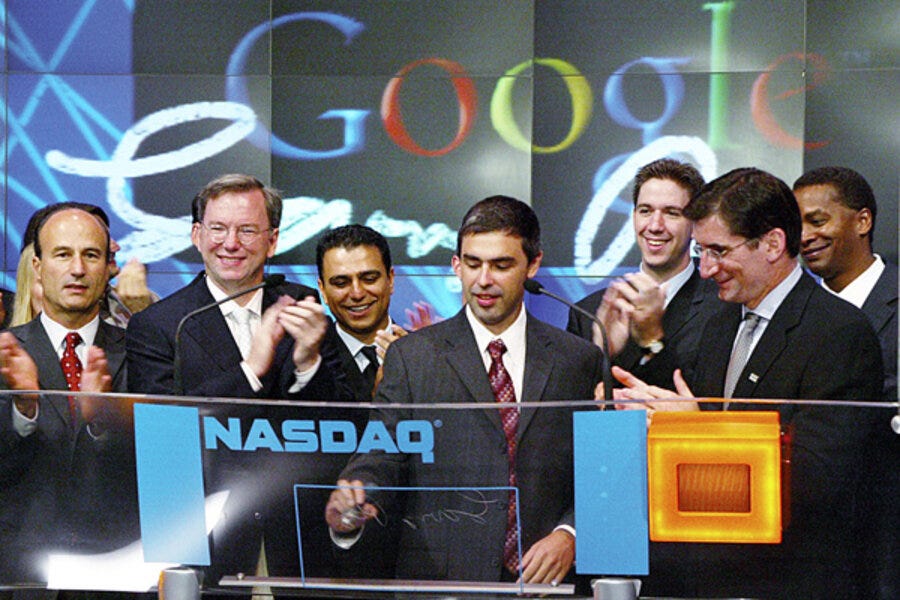
Visibility > Accuracy
This is the cost of being a quiet builder focusing on stealth startups. The media doesn’t reward subtlety. It rewards spectacle, clarity, and quotability. The more complex the truth, the faster it’s flattened.
Page wasn’t erased, but he was overshadowed. Not by failure, but by omission.
Meanwhile, today’s founders have learned. Elon Musk, Sam Altman, Brian Chesky, they don’t just build. They publish. They post. They podcast. They narrate. Because they understand that in modern tech, distribution is power, not just for product, but for perception.
If you don’t shape your legacy, someone else will write it for you. And they’ll probably get it wrong.
The Meta-Lesson
Larry Page’s story is extraordinary. But it’s also a cautionary tale for builders who think the work will speak for itself. It doesn’t. At least not always.
And in an era where storytelling is strategy, the quiet founder risks becoming a footnote in their own company’s myth.
8. Founders: Here’s What You Should Take Away
Larry Page didn’t rage against the system. He redesigned it.
His story isn’t just about brilliance or product sense. It’s about strategy, timing, and staying relevant in a game that often sidelines the very people who start it.
Here’s what founders should remember:
1. Titles are temporary. Leverage isn’t.
Page lost the CEO title, but never the vision, and eventually, not the power. Influence lasts longer when it's rooted in outcomes.
2. Power compounds quietly.
The best moves are rarely loud. Page reclaimed control not with declarations, but with a track record no one could ignore.
3. Vision without structure dies.
Alphabet wasn’t just a rebrand, it was a scalable architecture that preserved Page’s values while delegating operations. Build systems that outlive you.
4. Founders lead through what they back.
Gmail. Android. YouTube. Chrome. These weren’t committee decisions. They were bets made and protected by founders who knew where the future was going.
5. Absence doesn’t protect legacy, narrative does.
Page’s silence let others reshape the story. Visibility is part of the job now. Don’t vanish from your own myth.
6. The goal isn’t empire management. It’s future creation.
Page didn’t build to sit in meetings. He built to solve problems. So he engineered a company that freed him to do just that.
7. Don’t win fast. Win forever.
The long game is the founder’s real edge. Most won’t play it. Page did, and he’s still building.
Because in the end, vision paired with structure is the most underrated founder superpower of all.
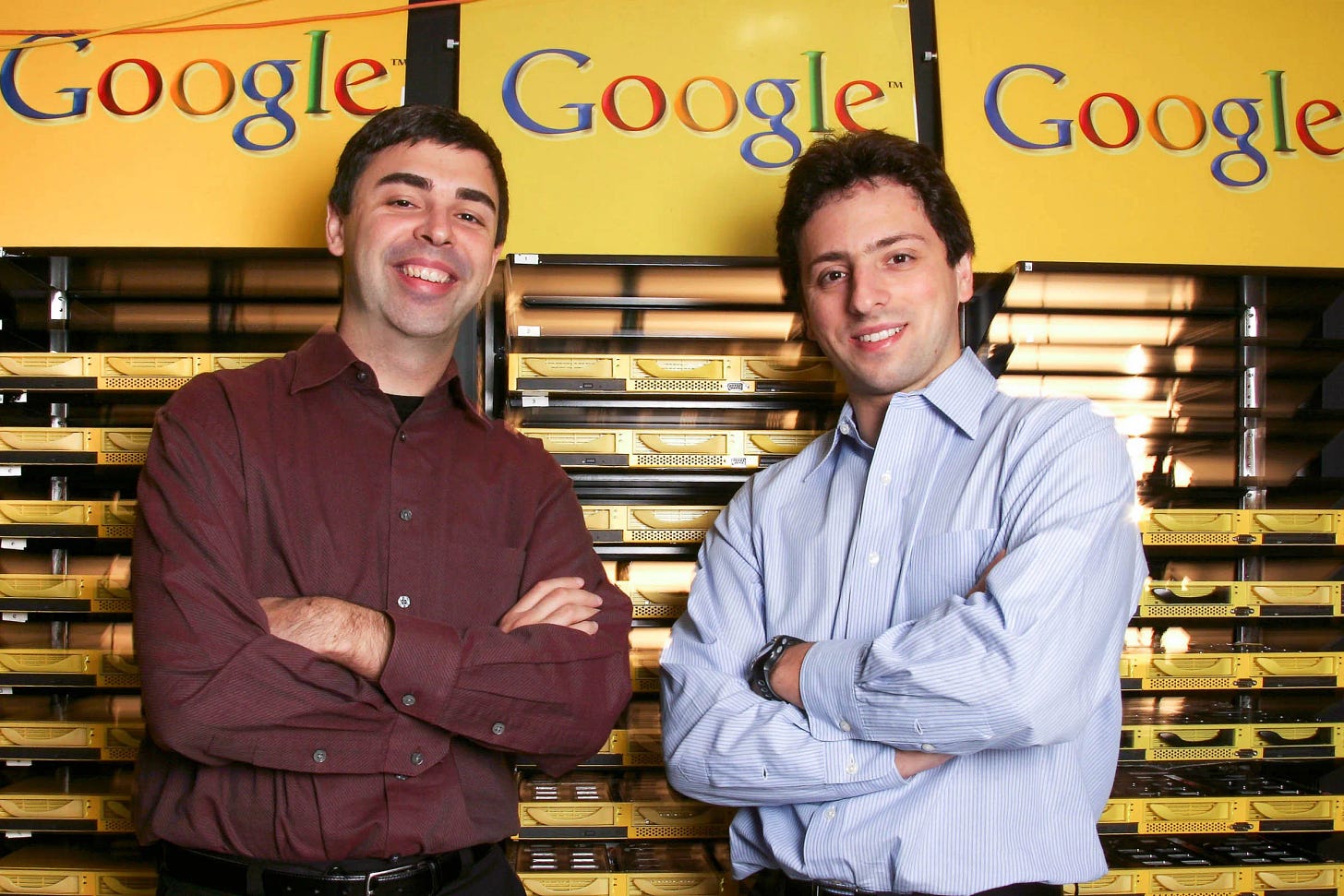

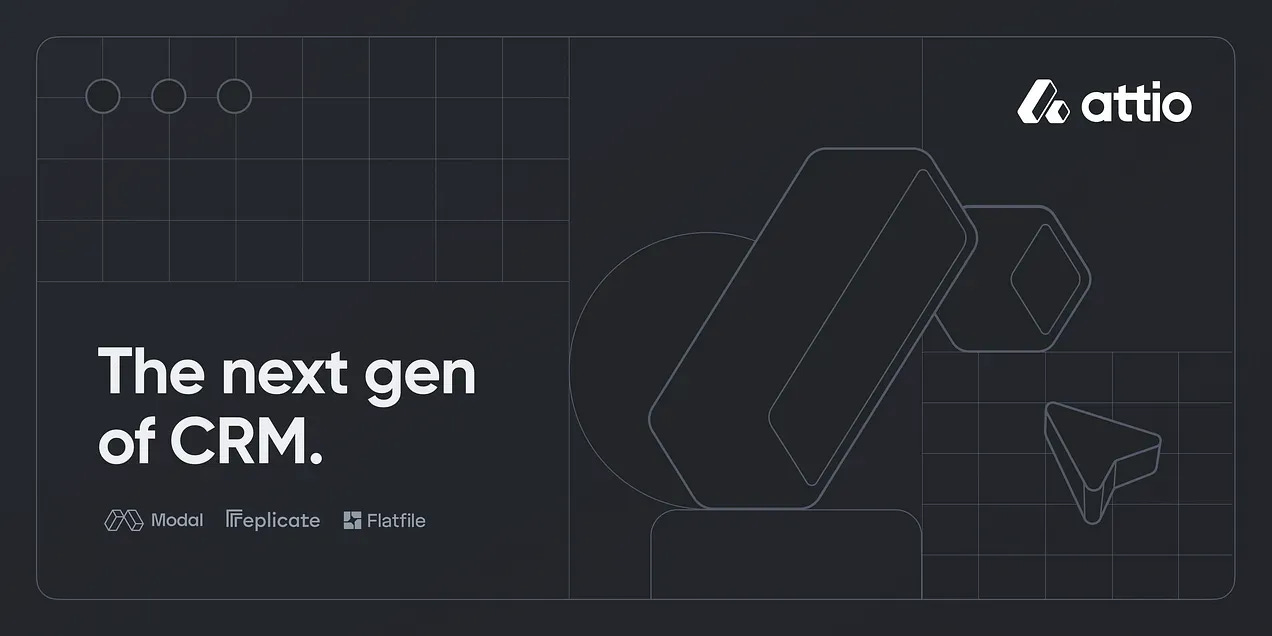
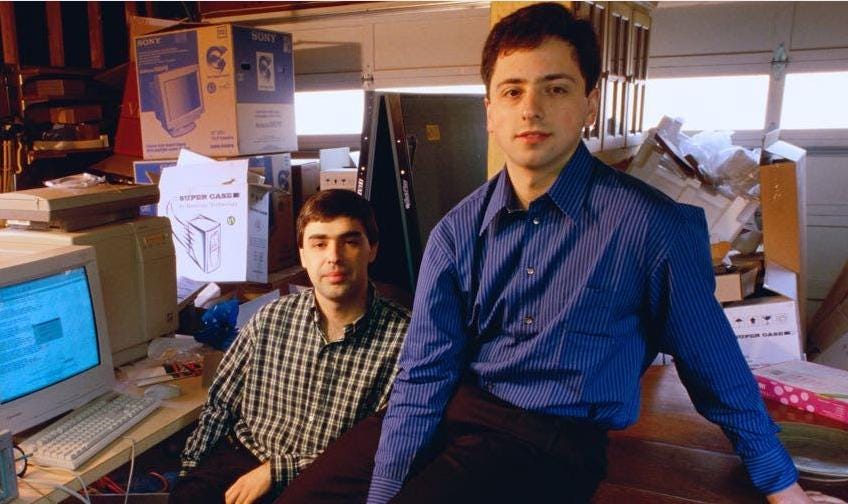
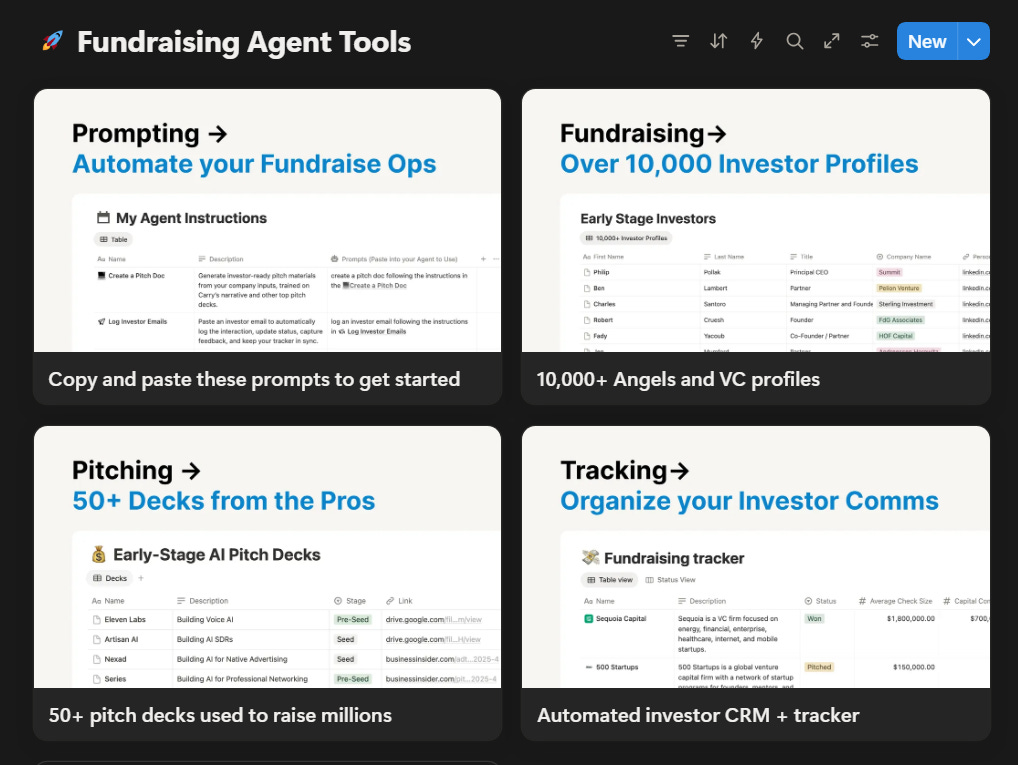
Never knew Larry Page tried to eliminate all of Google’s project managers in his early days. This notion is now more prominent than ever in this age of AI. Wonder if he wanted to test this again now…
The Alphabet restructure really stands out as one of the most elegant solutions to founder succession I've seen. What Page essentially did was create a holding company that allowed him to maintain strategic vision while delegating operational complexity - it's like he engineered his way out of the classic founder dilemma. The China breakpoint was also fascinatng, showing how founder values can override pure business logic even when you're not officially in charge.